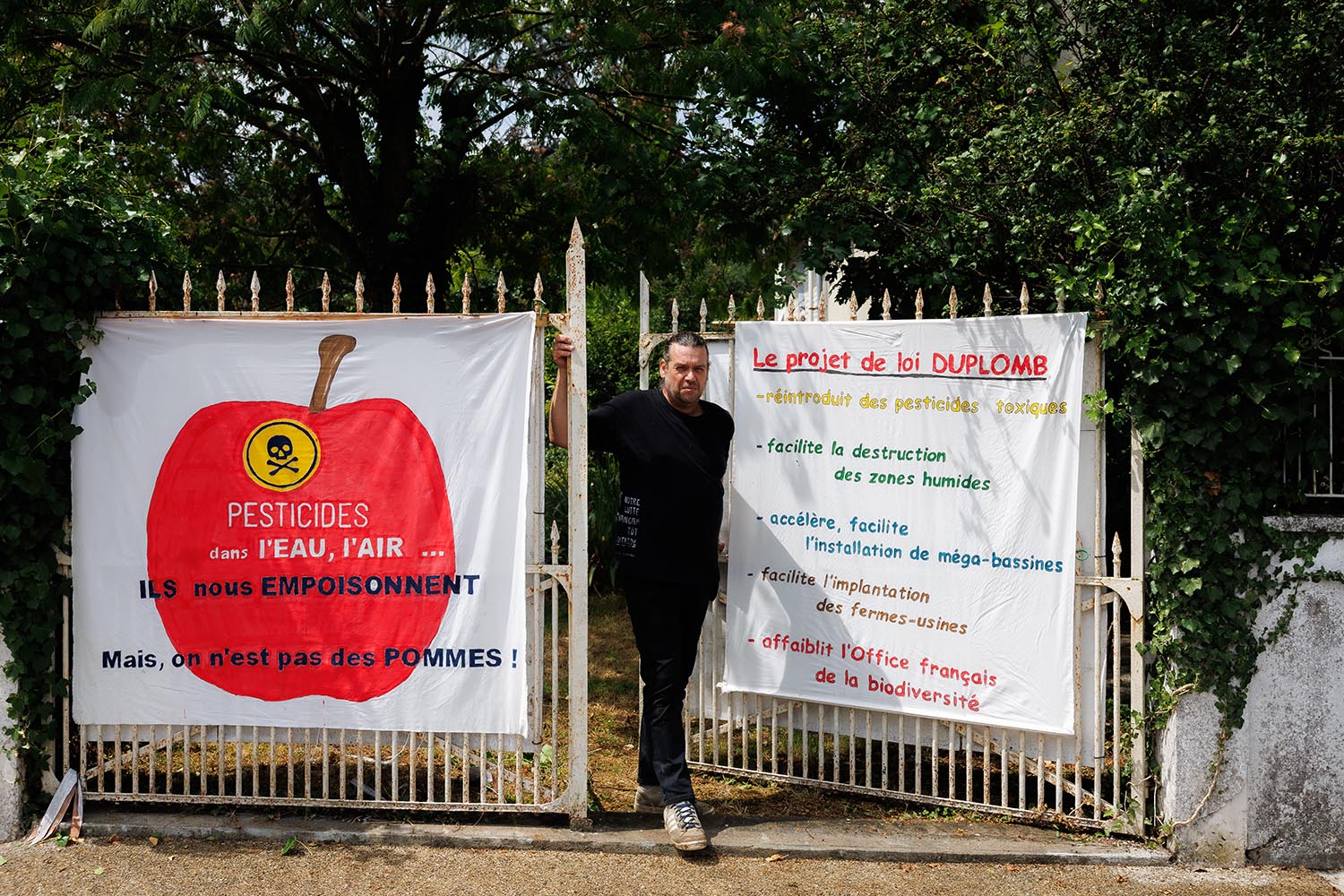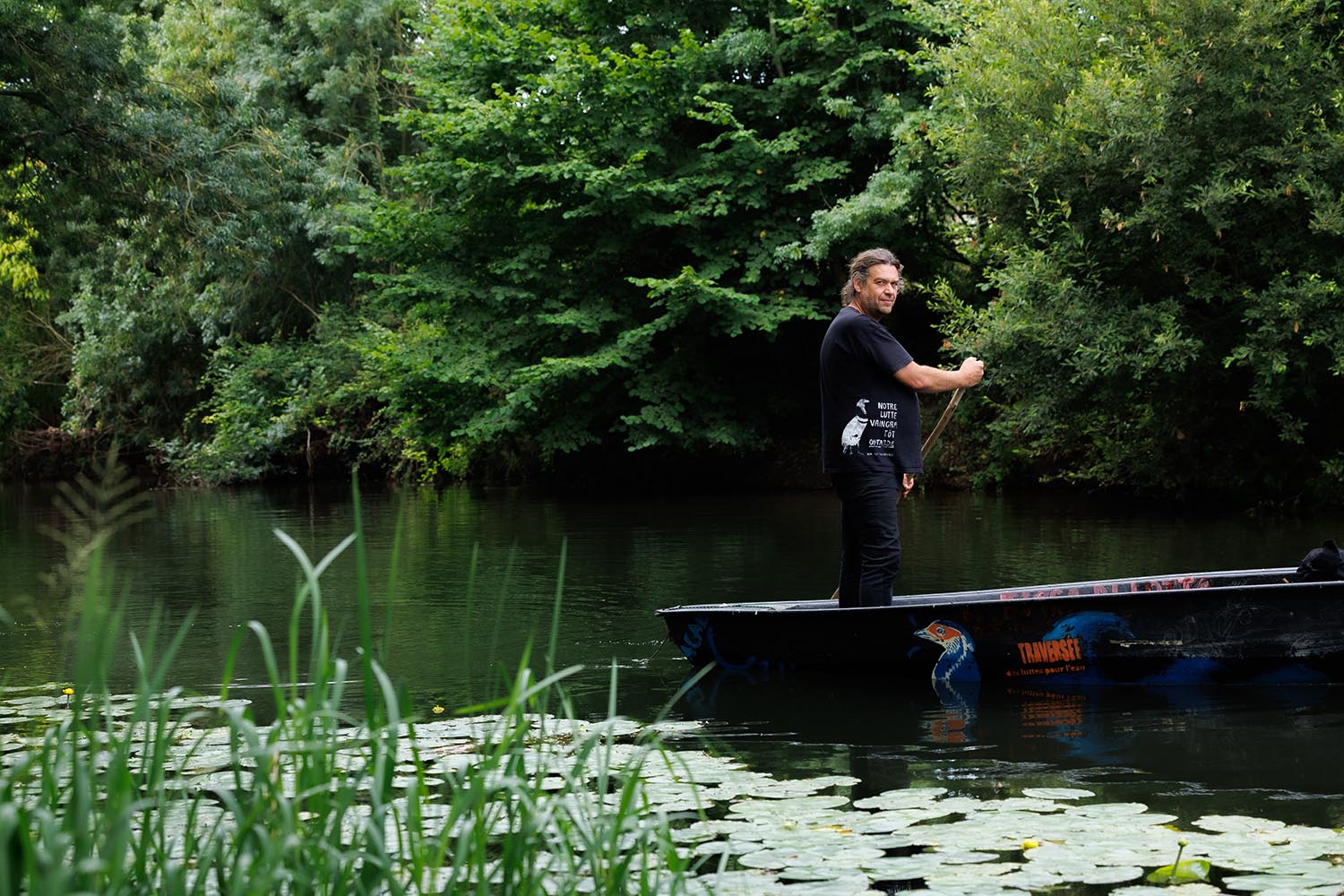It is a mild, calm morning in western France and Julien Le Guet – tall, softly spoken, his curly hair pulled back in a scrunchie – slowly punts his boat through the waterways of the Poitevin marshland.
Kingfishers dart from bank to bank, dragonflies hum in the foliage, and coypus, the industrious semi-aquatic rodents, ease into the water. Behind it all is the quiet rustling of corn in the fields abutting the canals that crisscross this corner of rural France.
But the tranquillity belies a sense of crisis gripping the country this summer. Weeks earlier, France was hit by a spell of extreme heat that killed at least 480 people. A large proportion of the country has water restrictions owing to drought. But limits on water supplies aren’t necessarily evenly distributed.
Le Guet is part of Bassines Non Merci, a collective that protests the construction of giant farming reservoirs – which activists have taken to calling “megabasins” – in the Nouvelle-Aquitaine region.
As France becomes drier, more and more of these vast, plastic-coated reservoirs that draw water from local aquifers in winter to be redistributed in summer have sprung up across the country.
There are believed to be more than 100 megabasins, though precise figures don’t exist. On average, they cover a surface area of eight hectares – the equivalent of about 10 football fields – though two projects, dubbed “gigabasins”, have planned spans of 18 hectares.
Le Guet says the reservoirs put the water table at risk in a time of scarcity, representing “the monopolisation of water for the benefit of a few” – the big agriculture firms that own the whispering cornfields that surround us.
Today, Le Guet is one of a group of environmentalists, researchers, scientists, public health advocates and organic farmers who have mobilised mass public sentiment against agriculture reforms that would roll back a number of environmental protections in France.
‘Nature restoration, biodiversity, zero pollution … these are being thrown under the bus right now’
Patrizia Heidegger of the European Environmental Bureau
The Duplomb law, named for its author, conservative MP Laurent Duplomb, would reintroduce a previously banned pesticide to France, ease regulations for factory farming and grants megabasin projects an automatic presumption of being in the public interest.
Bassines Non Merci has had major successes in the courts in recent years, blocking construction of reservoirs over threats to endangered species, such as the little bustard.
Under the new law, these victories will be harder to come by. “It is no longer up to developers to demonstrate that their project is of major public interest, but up to environmentalists to demonstrate that it is not,” Le Guet says. “It really turns the tables.”
More than 2 million people have signed a petition opposing the law – opening the possibility for a new debate in parliament, but not the repeal of the legislation, which has passed the national assembly and is awaiting Emmanuel Macron’s signature.
The fight over the reform is just one manifestation of a dynamic playing out across Europe – the fastest-warming continent on the planet – where the EU is in a race against the clock to introduce climate-friendly legislation aimed at limiting global warming to 1.5 degrees C as business groups and an empowered right wing demand concessions on major environmental laws.
In Brussels, the future of the European Green Deal, a trillion-euro package of measures launched in 2020 to hasten the transition to clean energy and meet net zero targets, has been looking shaky since the European parliament moved to the right in last year’s EU elections. Plans to address greenwashing have collapsed, a nature restoration law has been watered down, pollution targets for carmakers have been relaxed and environmental NGOs have had their funding targeted and, as in France, regulations for farmers have been rolled back.
Meanwhile, the far-right Patriots for Europe group recently seized control of talks on the EU’s 2040 climate target and have moved to kill it entirely. This threatens Europe’s ability to set its official climate goals going into the next round of international climate talks, to be held in Brazil in November.

“Europe is constantly seeking to have some kind of political or moral leadership in those negotiations,” says François Gemenne, a Belgian political scientist. “If Europe is not able to walk the talk, then its position will be greatly diminished.”
While European Commission president Ursula von der Leyen appears to be holding firm to the Green Deal’s commitment to net zero emissions by 2050, critics say other promises are being sacrificed to appease doubters as part of the shift from a focus on climate to one on “competitiveness” and “simplification” of regulations in the face of rising tariffs and Donald Trump’s aggressive trade agenda.
“Decarbonisation is something that a lot of industry sectors support because they understand that having access to cheap and reliable energy that doesn’t depend on Russia or the Emirates, or whatever country we don’t have control over, is only going to be beneficial to them. That’s the easier part of the Green Deal,” said Patrizia Heidegger, deputy secretary general of the European Environmental Bureau.
“It’s the other parts, like nature restoration, biodiversity or zero pollution, where it’s harder to convince corporate Europe to support the objectives,” she said. “These are the ones being thrown under the bus right now.”
Business groups say they feel the EU is finally listening to their demands for less bureaucracy. “Our position is not to say no to the Green Deal,” says Florence Naillat of Meti, a French group that represents the interests of medium-sized businesses. But she says: “We don’t think that forcing companies to spend billions of dollars across the economy on reporting exercises is going to bring about transformation and decarbonisation of the economy.”
Gemenne says the Green Deal always contained too much focus on regulation and not enough on the investment potential of the energy transition, but he fears the commission is now overly concerned about cutting red tape.
With the US once again set to withdraw from the Paris climate agreement, there is an opportunity for Europe to position itself as the global leader in climate action and attract investments, Gemenne says, but only if it seizes it.
‘In spring, these marshes should be at their most beautiful. There was nothing’
Julien Le Guet, protester
“It’s like if we were training for an Olympic marathon and we have a US competitor and a Chinese competitor. We see the Chinese competitor doubling up on his efforts, running 50km every day. And then, on the other side, we see the American competitor completely abandoning training, sitting on his couch, watching Netflix and eating crisps. And in Europe, we’re like: ‘What shall we do? Shall we mimic our Chinese competitor or the US competitor?’ To me, that’s a no-brainer.”
After a lifetime spent punting along the Poitevin marsh, Le Guet recently moved away following a breakup and the start of a new relationship further upriver. But that wasn’t the only reason he left.
“Two and a half years ago, I found myself taking a boat trip in the spring when the marshes are theoretically at their most beautiful – birdsong everywhere, bursting with flowers, insects, everything – and it was a terrible trip,” he says. “There was nothing. It was the silent spring.”
Still, on our tour of the waterways of his boyhood, Le Guet repeatedly stops the interview to show off their riches – a juvenile purple heron (“exceptional”), a slab of stone embossed with the outline of an ancient ammonite (“a souvenir!”), perhaps the nest of a lamprey on the riverbed (“extremely rare”). For him, this ecosystem is still worth fighting for.
The future of this climate-vulnerable continent will be won or lost in the halls of parliament in Paris and Brussels and at the negotiating tables of international climate conferences. But it will also be decided in these small slices of Europe where activists and corporations are fighting over the right to basic resources, such as water. As the clock runs down, no one has won yet.
“I’ve set myself the goal in my humble life to play a concrete role in saving the Poitevin marshes,” Le Guet says. “I haven’t given up.”
Photographs by Thomas Louapre/Divergence
